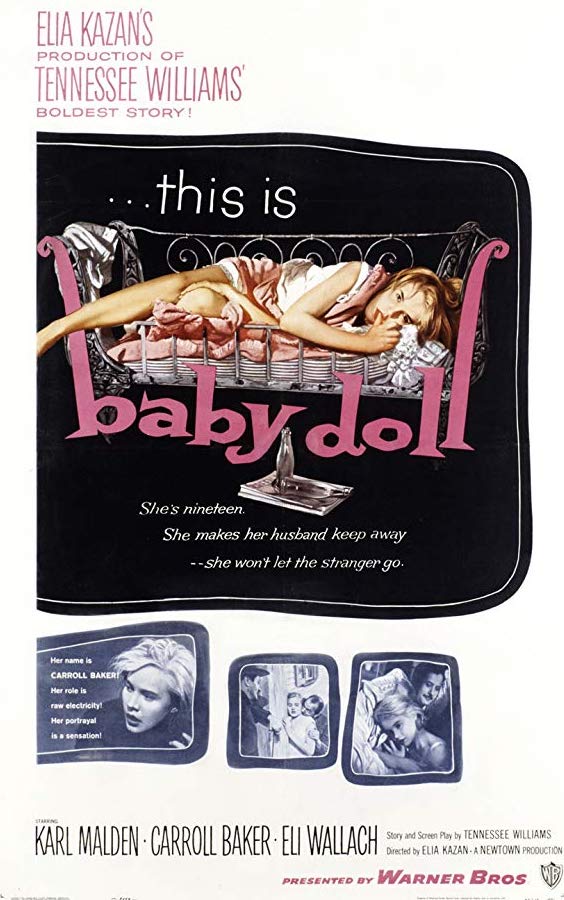

Baby Doll (Elia Kazan, 1956) wr. Tennessee Williams; Karl Malden, Eli Wallach, Carroll Baker
[A steamy tale of two Southern rivals and a sensuous nineteen-year-old virgin.]
Another gothic, OTT romp from Williams's 'steamy' mind, this is a story about a relationship between two strong men, who (admire and) compete with each other - not really for the 'sensuous' Caroll Baker, who, frankly, looks ridiculous in her 'baby-doll' pyjamas (as they came to be called, following the film).
Baker's character is used in the same way as Elizabeth Taylor's in Suddenly Last Summer - as a medium of communication between men, a means of getting another's man attention.
Malden and Wallach were both nominated for awards for this film. Wallach won a BAFTA for this; Malden won the Best Actor Oscar for Streetcar Named Desire.
The music is sleazy.
What follows is the whole of Bosley Crowther's review for the New York Times from 1956.
It looks as though the ghost of Tennessee Williams' Streetcar Named Desire has got bogged down in the mud of Erskine Caldwell's famous Tobacco Road in the screenplay Mr. Williams has written for Elia Kazan's Baby Doll.
For there is in this last picture, which opened at the Victoria last night with an elaborate benefit showing for the Actors Studio, a lot of the sort of personal conflict that occurred in Mr. Williams' former play taking place among characters in an environment in which Jeeter Lester would feel quite at home.
Mr. Williams again is writing tartly about decadence in the South in this film, which has drawn the condemnation of the Roman Catholic Church. His theme is the degeneration and inadequacy of old Southern stock, as opposed to the vital aggressiveness of intruding 'foreigners'. But where he was dealing with a woman of certain culture in A Streetcar Named Desire, he is down to the level of pure 'white trash' in this sardonic Baby Doll.
This is the major short-coming of Mr. Williams' and Mr. Kazan's film. Its people are virtually without character, content or consequence. Three of its four main people are morons or close to being same, and its fourth is a scheming opportunist who takes advantage of the others' lack of brains.
There is Archie Lee Meighan, the oafish owner of a broken-down country cotton gin, and his girl-wife, Baby Doll, an unmistakable victim of arrested development. Then there is Aunt Rose Comfort, an aged, pathetic simpleton, and there is wily Silva Vacarro, the 'foreigner' who runs a rival cotton gin.
And what is the pertinent business with which the film is concerned? It is the uncovering by Vacarro that Archie Lee has set fire to his cotton gin. And how does he do this? By dallying unrestrainedly with Baby Doll, who has never submitted to her husband and is fair prey for Vacarro's game.
These are the people and the story, and unless they were shaped with utmost skill they would be something less than trifling; they would be unendurable. But no one can say that Mr. Williams is not a clever man with his pen. He has written his trashy, vicious people so that they are clinically interesting. And Karl Malden, Carroll Baker, Mildred Dunnock and Eli Wallach have acted them, under Mr. Kazan's superb direction, so that they nigh corrode the screen.
Archie Lee, played by Mr. Malden, is a man of immense stupidity, rendered the more offensive by his treachery and bigotry; and Baby Doll, played by Miss Baker, is a piteously flimsy little twist of juvenile greed, inhibitions, physical yearnings, common crudities and conceits. Vacarro, played by Mr. Wallach, is dynamic, arrogant and droll, and Aunt Rose Comfort, played by Miss Dunnock, is a pitifully patient, frightened freak.
What is more, they are done with withering candor. No ugliness of their lives is spared. And Mr. Kazan has staged the afternoon dalliance of Baby Doll and Vacarro with startling suggestiveness. While he pointedly leaves it uncertain whether the girl is actually seduced, there is no question that she is courted and riotously pursued. Mr. Kazan keeps the courtship bouncing between the emotional and the ludicrous. The nonchalance of the pursuer is its most entertaining grace.
But Mr. Kazan's pictorial compositions, got in stark black-and-white and framed for the most part against the background of an old Mississippi mansion, are by far the most artful and respectable feature of Baby Doll.
Garry Gillard | reviews | New: 1 August, 2019 | Now: 5 February, 2022